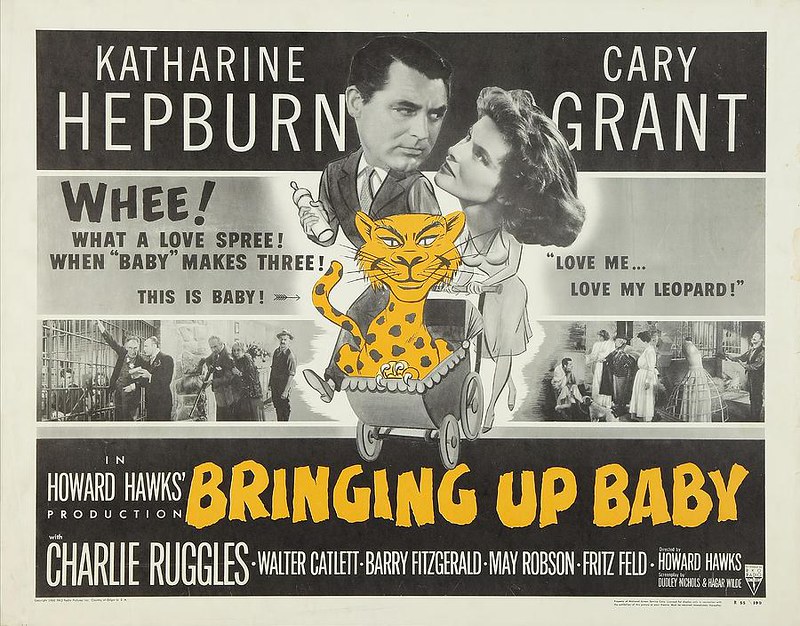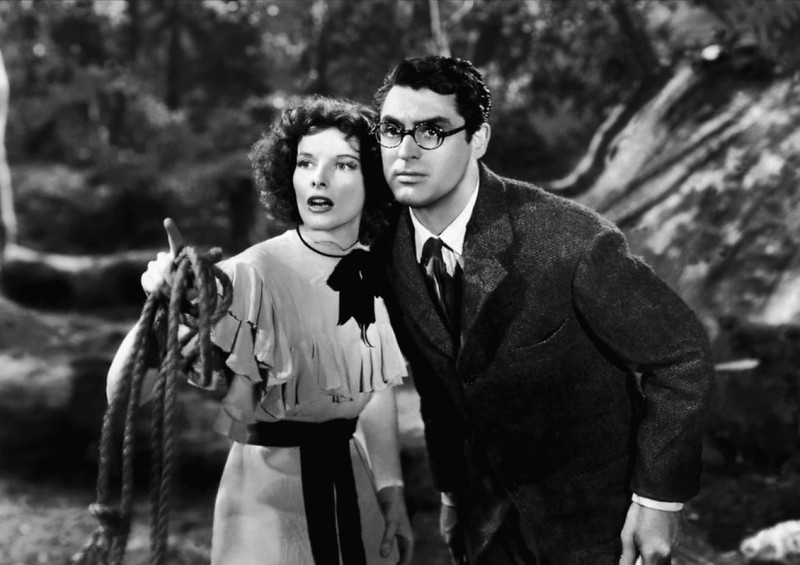The following is a transcript of my presentation on Bringing Up Baby, which was screened on April 7, 2022, at the Park Ridge Public Library…
An absent-minded paleontologist… a flighty heiress… a tame leopard who answers to the Depression song, “I Can’t Give You Anything But Love, Baby”… and a missing dinosaur bone. Most fans of classic cinema will recognize these elements. They make up what is arguably the defining film of screwball comedy– a brilliant movie that blends silliness with sophistication. In fact, it may very well be the screwiest one of the bunch. Bringing Up Baby from 1938 remains one of the greatest American films—a delirious, high-speed movie that is embraced as a comedy treasure.
The film was directed by Howard Hawks– the man who, in 1934, helped initiate the screwball tradition onboard his Twentieth Century with John Barrymore and Carole Lombard. At this point in his career, four years later, he was preparing to make Gunga Din. However, due to pre-production delays, Hawks instead turned his attention to a short story that had greatly amused him: Bringing Up Baby by Hagar Wilde. The story had the pet leopard, but not the comedy set-pieces we remember from the film. To help develop the story and its comedy potential, Hawks enlisted Dudley Nichols, a frequent John Ford contributor, as well as Wilde herself. Wilde would later work on Hawks’ I Was a Male War Bride, which would also star Cary Grant.
The story was tailored for Katharine Hepburn, who was then under contract to RKO, the studio producing the film. Her character is a role that Carole Lombard would’ve certainly done and it’s easy to imagine her doing it. Hawks may have considered Lombard, but Hepburn won out– in part because of Hepburn’s own similarities with the character she would be playing: the well-bred Susan Vance of Connecticut. It was at this time in her career when Hepburn was being viewed as “box-office poison” by the Independent Theatre Owners of America. It would not be until The Philadelphia Story, released two years later, when she was able to shed that label. But in late 1937, the studio, whether it was intended or not, was about to change her image away from the prim, intellectual characters she typically played.
As for her co-star, Hawks envisioned the great silent comedian Harold Lloyd in the role of the professor. However, the studio rejected this. Ironically, in 1938, Harold Lloyd appeared in a film called Professor Beware. Several major stars turned the role of David Huxley down, including Leslie Howard. Howard Hawks most likely had seen a rough cut of The Awful Truth—Cary Grant’s breakthrough role in screen comedy—and this may have influenced his decision. The Awful Truth took the slapstick that Grant had performed and elevated it to a whole new level. Grant would even wear glasses similar to those worn by Harold Lloyd. Lloyd would later say that Bringing Up Baby was the best constructed comedy he had ever seen.
Dudley Nichols and Hagar Wilde collaborated on one of the zaniest stories to come out of Hollywood. The plot has Cary Grant as a hen-pecked paleontologist, David Huxley, who is trying to obtain a grant for his museum. He is pursued by a carefree heiress, Susan (Katharine Hepburn). She practically forces herself on him. Some of their misadventures involve losing a rare dinosaur bone and trying to find Susan’s pet leopard, Baby. The irony of it all is that it’s the wacky heiress who gradually makes David more normal and changes his life for the better.
The supporting cast includes May Robson as Susan’s aunt, Charlie Ruggles as a big-game hunter, and Barry Fitzgerald as a drunken gardener. And there’s Skippy– Asta from the Thin Man movies—who is George the dog here. He was Mr. Smith in last week’s The Awful Truth.
According to Howard Hawks, when the production began, Katharine Hepburn was struggling with the characterization and was trying too hard to be funny. Hepburn wasn’t Carole Lombard and was in new territory in this type of farce. To help settle Katharine down, Hawks had vaudeville veteran Walter Catlett work with her. Hepburn was so impressed with Catlett that she insisted he play the town constable who tries to give her the parking violation. Her performance was deemed a success and she proved adept at comic timing and ad-libbing. However, this was more an anomaly in her career as she never again did anything quite like this. Hepburn was probably never more girlish than she was in this film.
Cary Grant, on the other hand, had experience in farce with his recent work in The Awful Truth. Still, he was playing a character unlike any he had played before. In fact, there were not many male movie stars at that time who would’ve appeared in a woman’s negligee as Grant does here. Within this madcap world, there are many moments in which Grant shines. In this film, we see those qualities that really define his comedy technique. Look for the scene of David sitting on the steps in the negligee, trying to get a word in but just giving up.
The comedy in Bringing Up Baby comes from the situations—not through deliberately funny lines of dialogue. The characters play it straight in these ridiculous moments. And when you lampoon characters who are distinguished—or purport to be– the funnier it becomes. This principle of comedy goes back to the days of Charlie Chaplin in which the more dignified a character was, the funnier it became to see him humiliated.
According to filmmaker Peter Bogdanovich in his audio commentary for the film, the on-screen relationship between Susan and David was partially inspired by the “lovingly antagonistic” relationship between Katharine Hepburn and director John Ford, whom she worked for on 1936’s Mary of Scotland. In fact, the glasses that Cary wears in the film are also reminiscent of John Ford’s. The screenwriter, Dudley Nichols, had written Mary of Scotland and would have been privy to the workings of this relationship between director and star. But in all fairness, there is no actual proof that their relationship was romantic.
The performances throughout Bringing Up Baby seem very spontaneous, especially with the overlapping dialogue, but everything was carefully rehearsed. The film is very fast-paced, but this is accomplished through movement in the frame, as Hawks has pointed out in interviews, not through the editing. He simply has the characters moving fast rather than using cross-cutting.
Cary Grant and Howard Hawks made five films together, and in each one we see unique characterizations that range from comedy like this to the dramatic as in Only Angels Have Wings. These films show Grant’s range as an actor within that famous “Cary Grant Persona.” Additionally, Bringing Up Baby was the second of four films Grant would make with Katharine Hepburn. The first was 1935’s Sylvia Scarlett, which made RKO take notice of their chemistry together.
Bringing Up Baby ran over schedule and over budget. This was part of the reason why Hawks’ RKO contract was dissolved and he never finished Gunga Din. (George Stevens directed that film.) Bringing Up Baby did not live up to expectations at the box office. It was not a huge commercial failure, although it did flop in New York City. It was, overall, rather spotty at the box office. It wouldn’t be until after the film’s second run in theatres that it turned a profit, and it wouldn’t be until the 1950s when it played on television that its reputation grew. The French always loved Howard Hawks and admired Bringing Up Baby in particular. It’s easy to see why with its elements of farce and its pacing which is reminiscent of some of the great French comedies.
As to its failure to reach a wider audience in America at the time of its release, Howard Hawks told Peter Bogdanovich, “There were no normal people in it. Everyone you met was a screwball… I think it would have done better at the box office if there had been a few sane folks in it.”
Its perceived commercial failure at the time is immaterial now. The film was ultimately embraced for the world it created—with all its insane characters. As moviegoers, we are glad the film came out the way it did. In the end, Bringing Up Baby has had the last laugh.
~MCH

